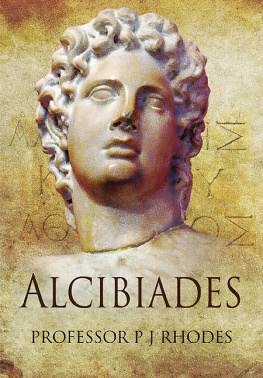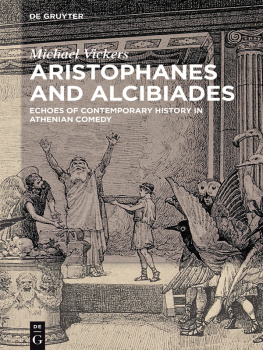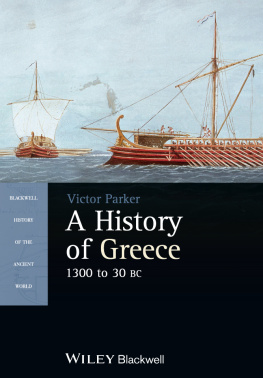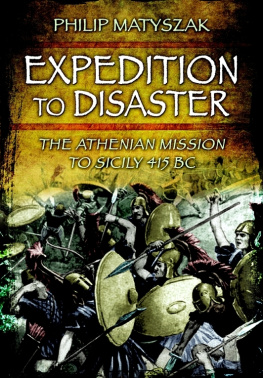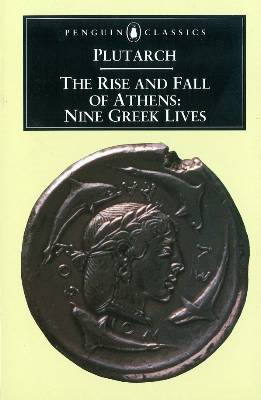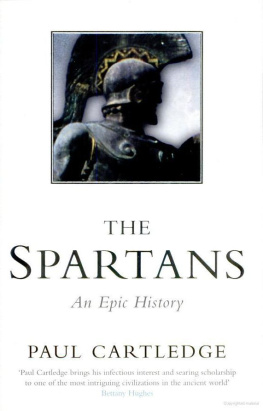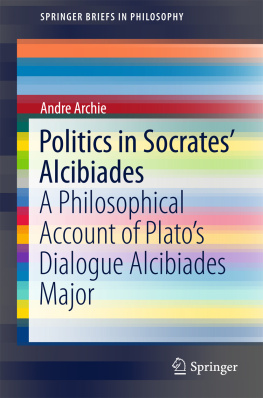First Published in Great Britain in 2011 by
Pen & Sword Military
an imprint of
Pen & Sword Books Ltd
47 Church Street
Barnsley
South Yorkshire
S70 2AS
Copyright P. J. Rhodes 2011
ISBN 978 1 84884 069 0
ePub ISBN: 9781848849822
PRC ISBN: 9781848849839
The right of P. J. Rhodes to be identified as Author of this Work has been
asserted by him in accordance with the Copyright, Designs and Patents Act 1988.
A CIP catalogue record for this book is available from the British Library
All rights reserved. No part of this book may be reproduced or transmitted in any
form or by any means, electronic or mechanical including photocopying,
recording or by any information storage and retrieval system, without permission
from the Publisher in writing.
Typeset in Ehrhardt by Phoenix Typesetting, Auldgirth, Dumfriesshire
Printed and bound by MPG Books Group
Pen & Sword Books Ltd incorporates the Imprints of Pen & Sword Aviation, Pen
& Sword Maritime, Pen & Sword Military, Wharncliffe Local History, Pen and
Sword Select, Pen and Sword Military Classics, Leo Cooper, Remember When,
Seaforth Publishing and Frontline Publishing.
For a complete list of Pen & Sword titles please contact
PEN & SWORD BOOKS LIMITED
47 Church Street, Barnsley, South Yorkshire, S70 2AS, England
E-mail:
Website: www.pen-and-sword.co.uk

Contents
List of Plates
)
)
)
)
Maps
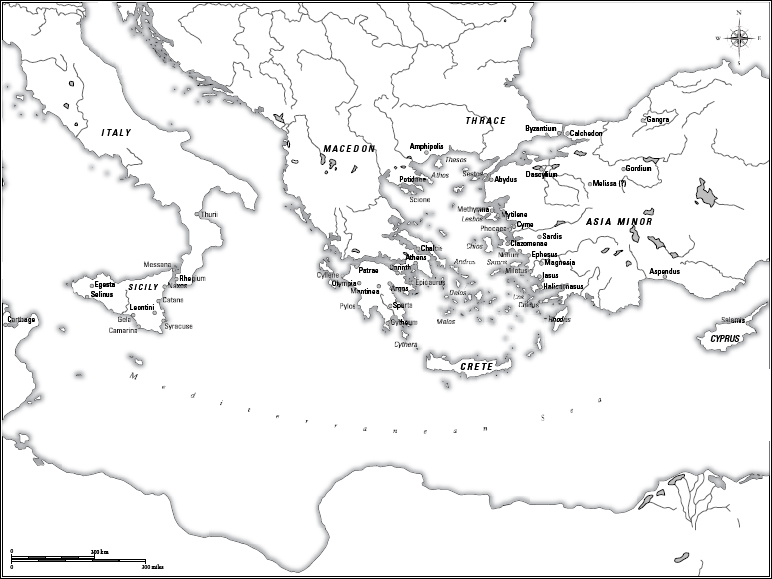
Map 1. The Greek World
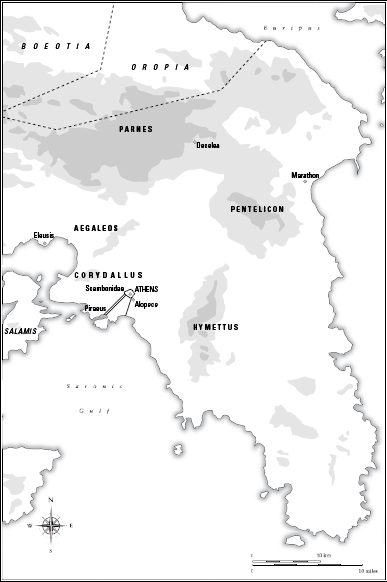
Map 2. Attica
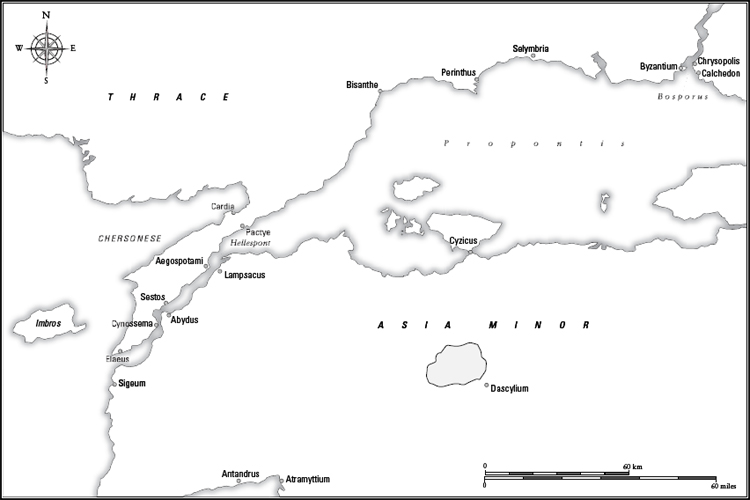
Map 3. The Hellespont, Propontis and Bosporus
Preface
In 1984, in order to talk about the study of ancient history, I delivered my inaugural lecture as Professor of Ancient History at Durham on What Alcibiades Did and What Happened to Him (the formulation used in Aristotles Poetics to characterize history in contrast to poetry). For this opportunity to write at greater length about what that flamboyant and intriguing man did and what happened to him I thank Mr. P. Sidnell and Pen and Sword Books, Dr. S. English, who put us in touch with each other, and everybody else who has been involved in the production of this book. In particular I thank all those who have supplied and given me permission to use the illustrations reproduced here; also Dr. A. Makres, who helped me to obtain some of the illustrations I wanted, Prof. L. Rubinstein, for the draft of an article on Alcibiades chariot-team, and Dr. P. Thonemann, for allowing me to use the results of his work on Melissa, where Alcibiades is said to have died.
P.J.R .
References and Abbreviations
For ancient texts I use the abbreviations of the third edition of the Oxford Classical Dictionary , or occasionally a slightly fuller form. For Plutarchs Lives I subdivide the chapters into sections as in the Bud and Teubner editions, but readers are warned that the Loeb edition subdivides the chapters into fewer, larger sections. For modern works I use short references in the notes and give full details in the Bibliography (noting there the abbreviations which I use for a few frequently-cited works); titles of academic periodicals are abbreviated as in LAnne philologique , with the usual anglophone modifications (principally AJP etc. where L Anne philologique uses AJPh etc.). Superior figures (as in CQ) denote the second and subsequent editions of a book, and the second and subsequent series of a periodical.
Chapter I
Sources and Modern Studies
Ancient Sources
As one of the leading public figures of his time, Alcibiades appears in the history of Thucydides (down to autumn 411, where the text breaks off) and the Hellenica of Xenophon (which began approximately where Thucydides text ends); also in the universal history written in the first century BC by Diodorus Siculus (for this part of its Greek history derived from the fourth-century historian Ephorus: based on Thucydides down to 411 but independent of Xenophon afterwards).
Thucydides was born some time before 454, was related to Cimon and Thucydides son of Melesias, who had been leading opponents of Pericles in the mid fifth century, but himself became a strong admirer of Pericles; he was an Athenian general in 424/3, but as a result of his failure to keep the city of Amphipolis out of the hands of the Spartans he was exiled for the remainder of the Peloponnesian War. He has appealed to modern scholars as a historian who was highly intelligent and determined to get at the truth; but he was a man who must have had his own prejudices, and cannot have been the dispassionate, scientific historian he was once taken to be. His history of the Peloponnesian War of 431404 (which includes in book I a sketch of the growth of Athenian power after 478, written to show how that led Sparta to make war on Athens) is narrowly focused on the war, and does not range as widely as many modern readers would have wished.
Thucydides seems to have been particularly well informed about Alcibiades, and his information extends beyond facts in the public domain to private conversations.
Alcibiades appears also in contemporary literature. There are allusions and two speeches of Lysias, (XIV) Against Alcibiades i and (XV) Against Alcibiades ii , were written as supporting speeches for the prosecution of Alcibiades IV on a charge of failing to serve in the army when required, c . 395. Because our Alcibiades had been one of the young men who associated with the philosopher Socrates, he appears also in the dialogues of Plato: in particular, he bursts riotously into the Symposium to praise Socrates; the dialogue known as Alcibiades i is acepted by some scholars but not by all as an authentic work by Plato, but Alcibiades ii is generally regarded as a later composition.
We also have the evidence of some Athenian public documents inscribed on stone in Alcibiades lifetime; I mention here those which are of particular significance. One, recently discovered, is the beginning of a decree of the Athenian assembly proposed by him in 422/1, slightly earlier than any other reliable attestation of him as a public figure.
Modern Studies
In modern work as in ancient, Alcibiades appears in general histories of the period, such as the Cambridge Ancient History , J.K. Davies Athenian Propertied Families is not always easy to use, but is a very rich collection of evidence for and discussion of family connections and property.
The best of the earlier books devoted specifically to Alcibiades is in French and dates from the mid twentieth century: J. Hatzfeld, Alcibiade . An article by M.F. McGregor, The Genius of Alcibiades, was uncritically admiring; at the other extreme, E.F. Bloedow, Alcibiades Reexamined , argued that Alcibiades was both unsuccessful and unimportant. W.M. Ellis, Alcibiades , is like this book an account of Alcibiades written for a wide readership. D. Gribble, Alcibiades and Athens , is as its sub-title (A Study in Literary Presentation ) indicates not a life of Alcibiades but a study of the presentation of him in Greek literature. A recent book in German, C. Mann, Die Demagogen und das Volk , argues that Alcibiades marked a fundamental break with the kind of political leader Athens had in the century before him. I outlined Alcibiades career and significance briefly in my inaugural lecture, What Alcibiades Did or What Happened to Him .
Next page
